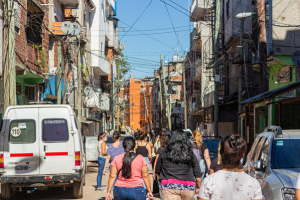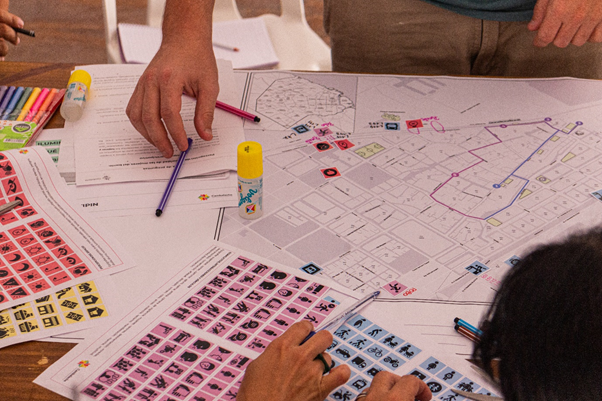[Technical Cooperation Buenos Aires] Second field mission and introduction to walking diagnosis
In April 2021, CODATU signed a 3-year technical cooperation agreement with the French Development Agency (AFD) and the Government of the City of Buenos Aires to support the Argentine capital in its urban development and sustainable mobility projects.
Within the City of Buenos Aires, three entities benefit from the technical cooperation program: the Secretariat of Transport and Public Works (SECTOP), the Ministry of Public Spaces and Urban Hygiene (MEPeHU) and the City Housing Institute (IVC).
The initiatives supported are part of the response to the urban challenges identified in the light of the COVID-19 pandemic. The pandemic has had a lasting impact on the relationship between public space and the daily mobility of the inhabitants of Buenos Aires, particularly in the most vulnerable neighborhoods. Technical cooperation supports projects to improve public spaces, develop active modes of transport and improve accessibility in the city’s vulnerable neighborhoods, through the exchange of best practices and the financing of studies.

A face-to-face mission, the second since the beginning of the technical cooperation (the article on the first mission is available here), took place from March 14 to 18, 2022 in Buenos Aires. The week was punctuated by two highlights, namely the meetings to finalize the calls for tender, as well as a series of events organized around the walking diagnosis tool.
Technical meetings with municipal teams to define the objectives of the studies
The technical meetings held during the week with the City’s Housing Institute (IVC) helped to finalize the precise content of the study, which will start in the second half of 2022 and should result in proposals for the development of public spaces located in Barrio 20, a popular neighborhood of the City, in the Papa Francisco neighborhood, located next to Barrio 20 and undergoing urbanization since 2016, as well as in the public spaces that provide a link between the neighborhood and the formal city. The last working meetings with the IVC, the contracting authority for this study, have established the level of detail that will be required of the consulting team. The meetings with the Ministry of Public Spaces and Urban Hygiene (MEPeHU) were aimed at restructuring the study’s outlines, which should lead to the creation of a methodological guide for implementing interventions in public space in 48 streets, one for each of the 48 neighborhoods that make up the City of Buenos Aires. This study is scheduled to begin in September 2022.
Theoretical and practical reflections on the walking diagnosis

The other event of this second mission in Buenos Aires was the launching of the walking diagnosis, an activity that aims to obtain a better knowledge of the needs in terms of public space, mobility, or any other socio-urban aspect of interest, by collecting the feelings of the inhabitants of the neighborhood. Within the framework of the technical cooperation, the walking diagnosis must allow to feed the IVC study which concerns the proposal of public spaces development in the district 20 and its surroundings. This activity consists of a walk followed by a workshop in a room to produce a participatory mapping of the space. A Franco-Argentinean pair of consultants was hired by CODATU to carry out this activity: Kelly UNG from Approches! and Sofia LISMAN were able to share their expertise of the tool with the actors of the cooperation.
This mission allowed for a theoretical presentation of the walking diagnosis to officials of the City of Buenos Aires with a view to future use of the tool by the teams, to organize a practical exercise in one of the neighborhoods of the City of Buenos Aires, as well as to conduct three walking diagnoses in Barrio 20. In order to be able to collect data specific to the different groups studied in this neighborhood: a group of women, a group of mixed youth and a group of seniors and people with reduced mobility were selected to carry out a mapping each.
A steering committee meeting held at the end of the mission was used to draw up the outlines of a visit by an Argentinean delegation to France in July 2022 and a third field mission to Buenos Aires in October 2022 in connection with the C40 Mayors’ World Summit to be held in the Argentinean capital.
